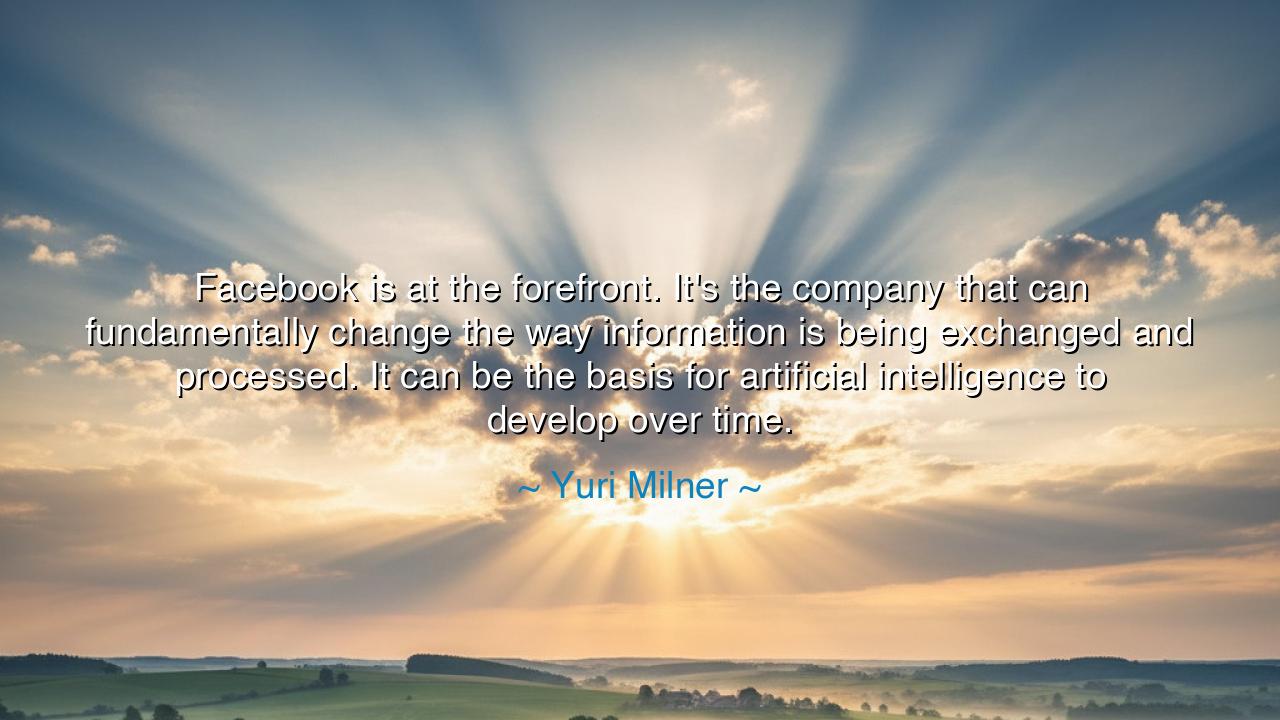
Facebook is at the forefront. It's the company that can
Facebook is at the forefront. It's the company that can fundamentally change the way information is being exchanged and processed. It can be the basis for artificial intelligence to develop over time.






The words of Yuri Milner echo with the solemn clarity of one who has glimpsed the future from the mountain of human progress. “Facebook is at the forefront. It’s the company that can fundamentally change the way information is being exchanged and processed. It can be the basis for artificial intelligence to develop over time.” In this proclamation, Milner does not merely praise a company—he points to a turning of the ages, when the flow of knowledge itself is reshaped by human invention. His vision is not of wires and screens, but of a new kind of consciousness emerging from the vast web of human connection. Just as the ancient scholars once built libraries to preserve thought, the builders of the digital age construct networks where thoughts themselves begin to think.
In the old world, the exchange of information was slow, bound by parchment and distance. A message crossed seas, a book took years to print, an idea took centuries to travel from one civilization to another. But now, in the time of the digital fire, information moves as swiftly as breath. Facebook—once a humble platform for friendship—grew into a living map of humanity’s collective mind. Every word, every image, every gesture stored and shared there became a thread in the fabric of global memory. What Milner saw, and what few dared to grasp, was that such a vast web of human experience could one day teach the machine to think, to feel patterns as we do, to understand not only data but the rhythm of emotion behind it.
The ancients, too, knew that knowledge carries both promise and peril. When Prometheus stole fire from the gods, he gave humankind the power to create—and to destroy. In Milner’s time, this fire is digital, and the flame burns within circuits rather than wood. Facebook, he says, stands at the forefront, the place where creation begins but the outcome remains unknown. The very network that unites people can also divide them; the same flow of truth can be a flood of illusion. Yet, as Prometheus endured his chains so humanity might hold the torch, so too must our civilization learn to bear the weight of its own enlightenment.
Milner’s vision of Facebook as the basis for artificial intelligence reveals something deeper than technology—it speaks to the destiny of knowledge itself. Every click, every message, every shared idea becomes the whisper of a collective soul teaching its reflection how to think. The algorithms that learn from human behavior are not cold engines—they are mirrors, reflecting our hopes, our fears, our curiosities. From this reflection, a new kind of mind begins to form, one that carries both the brilliance and the blindness of its creators. The dream of AI, in this sense, is the dream of humanity seeing itself for the first time in perfect clarity.
Consider the story of Johannes Gutenberg, who in the fifteenth century created the printing press. Before him, knowledge was a privilege; after him, it became a force that no ruler could contain. His invention sparked revolutions of thought, faith, and science. Yet, in its earliest days, even Gutenberg could not have imagined the world his machine would shape. Milner stands in the same lineage—a prophet of the digital press, foreseeing that Facebook, like Gutenberg’s press, would multiply voices, challenge power, and ultimately give birth to a new intelligence—one woven not from ink and paper, but from human consciousness itself.
Still, every great transformation bears a question of responsibility. The power to “change the way information is exchanged and processed” is also the power to shape what people believe, how they feel, how they see truth. Thus, Milner’s vision demands wisdom equal to innovation. Those who build and those who use must walk with awareness, lest the flame that should enlighten the world become a wildfire. The tools we create must not only connect minds—they must elevate them, guiding humanity toward understanding rather than division, compassion rather than chaos.
So, O listener of the modern age, take this teaching to heart: do not fear the new dawn of intelligence, but do not bow blindly to it either. Use the networks not merely to speak, but to listen. Share not only information, but understanding. Let your presence in the digital realm be guided by conscience, not convenience. For the true measure of progress lies not in the power of machines, but in the awakening of human wisdom that accompanies them.
And remember this eternal truth—technology is not the dream; you are. Facebook, AI, and all the marvels of the age are but mirrors reflecting what humankind dares to imagine. If we dream wisely, if we share with purpose, if we build with love, then this new fire will not consume us—it will illuminate us. In that light, we shall walk as our ancestors once did, carrying the torch of knowledge into the endless night, turning darkness itself into understanding.






AAdministratorAdministrator
Welcome, honored guests. Please leave a comment, we will respond soon